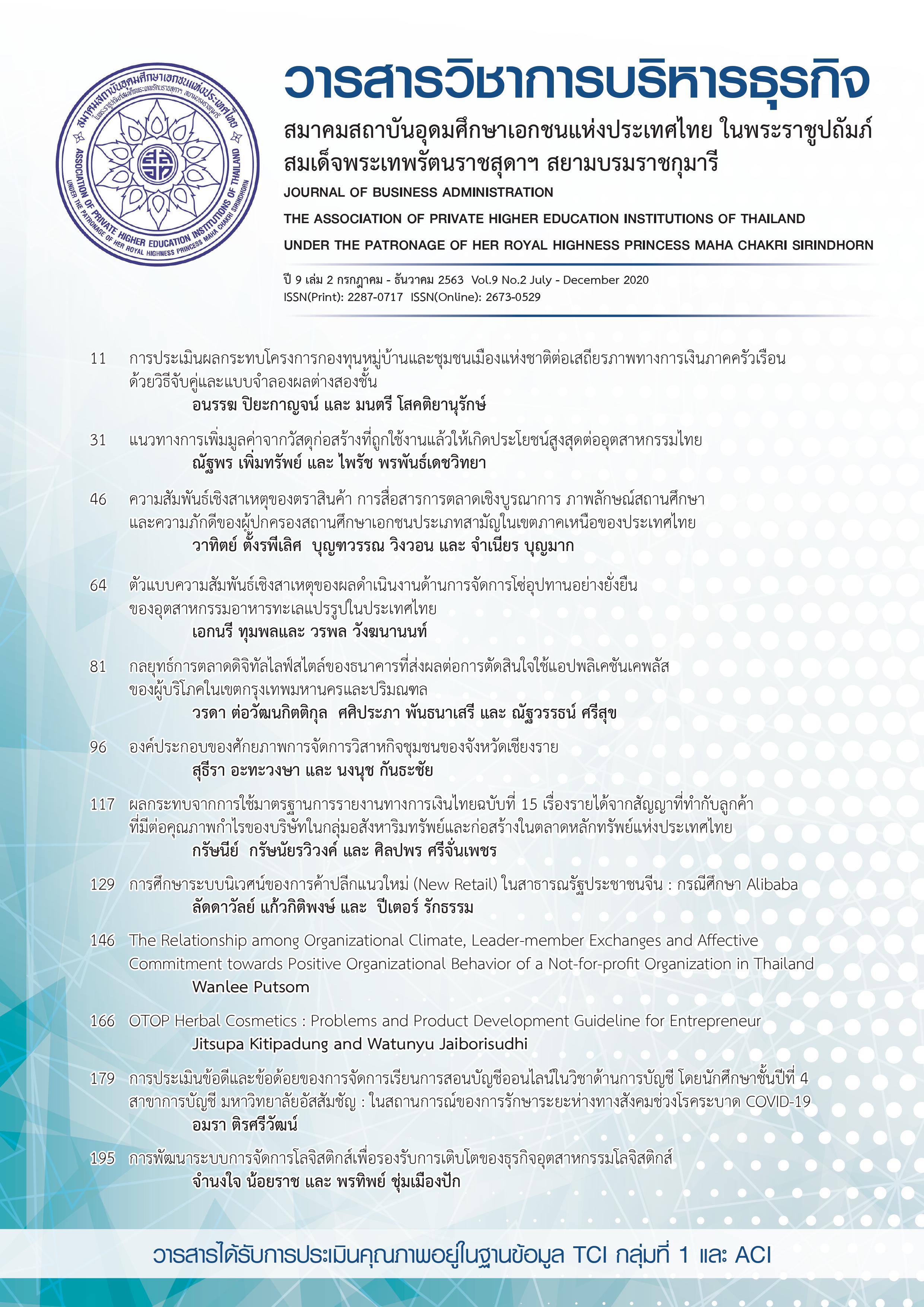การประเมินผลกระทบโครงการกองทุนหมู่บ้านและชุมชุนเมืองแห่งชาติต่อเสถียรภาพ ทางการเงินภาคครัวเรือนด้วยวิธีจับคู่และแบบจำลองผลต่างสองชั้น
คำสำคัญ:
กองทุนหมู่บ้าน, ปัญหาความเอนเอียงในการคัดเลือก, วิธีการจับคู่ด้วยคะแนนความโน้มเอียง, แบบจำลองผลต่างสองชั้น, เสถียรภาพทางการเงินภาคครัวเรือนบทคัดย่อ
การศึกษาในครั้งนี้เป็นการศึกษาผลกระทบของโครงการกองทุนหมู่บ้านที่มีต่อเศรษฐกิจภาคครัวเรือนในระดับจุลภาค
โดยตรง มุ่หวังที่จะเห็นถึงผลกระทบจากการดำเนินโครงการกองทุนหมู่บ้านและชุมชนเมืองแห่งชาติในระดับครัวเรือน
โดยอาศัยอัตราส่วนทางการเงินที่สำคัญที่นิยมใช้ในการวิเคราะห์ฐานะทางการเงินของภาคธุรกิจมาประยุกต์ใช้ ซึ่งทำให้สามารถ
เห็นถึงผลกระทบที่เกิดขึ้นจากการเข้าร่วมโครงการในมิติที่ชัดเจนมากขึ้นกว่าการเปรียบเทียบผลกระทบโดยตรงต่อสถานะ
ทางเศรษฐกิจครัวเรือน เป็นการประเมินผลกระทบด้วยวิธีการจับคู่ความน่าจะเป็นในการเข้าร่วมโครงการ (Propensity Score
Matching) และแบบจำลองผลต่างสองชั้น (Difference in Difference) ด้วยสมการถดถอยแบบโลจิสติกส์ การศึกษานั้น
ใช้ประโยชน์จากข้อมูลอนุกรมเวลาแบบใช้ตัวอย่างซ้ำของสำนักงานสถิติแห่งชาติ จำแนกกลุ่มประชากรเป็นรายภาค
ตามการจำแนกของสำนักงานสถิติแห่งชาติ ประกอบด้วย ภาคกลาง (ไม่รวมกรุงเทพมหานครและปริมณฑล) ภาคเหนือ
ภาคตะวันออกเฉียงเหนือ และภาคใต้
ผลการศึกษาผลกระทบรายปีแสดงให้เห็นว่า ครัวเรือนที่กู้ยืมเงินกองทุนหมู่บ้านมีเสถียรภาพทางการเงินต่ำากว่าครัวเรือน
ที่ไม่ได้กู้ยืม ทั้งในมิติด้านสภาพคล่อง ภาระในการชำระหนี้ ความเสี่ยงที่จะล้มละลาย และความสามารถในการดำรงการบริโภค
ยกเว้นภาคใต้ที่ครัวเรือนที่กู้ยืมมีเสถียรภาพทางการเงินไม่ต่างจากครัวเรือนที่ไม่ได้กู้ยืม โดยผลการศึกษาจากแบบจำลองผลต่าง
สองชั้นพบว่า การกู้ยืมเงินกองทุนหมู่บ้านส่งผลให้ครัวเรือนที่กู้ยืมเฉพาะในภาคกลางและภาคตะวันออกเฉียงเหนือมีสภาพคล่อง
ครัวเรือนลดต่ำลง ในขณะที่ความสามารถในการดำรงการบริโภคของครัวเรือนภาคใต้ที่กู้ยืมเพิ่มสูงขึ้น ทั้งนี้การกู้ยืมเงินกองทุน
ในระยะเวลาที่นานขึ้นส่งผลให้ครัวเรือนภาคกลางมีความเสี่ยงที่จะล้มละลายเพิ่มสูงขึ้น
ดาวน์โหลด
เผยแพร่แล้ว
รูปแบบการอ้างอิง
ฉบับ
ประเภทบทความ
สัญญาอนุญาต
บทความที่ลงตีพิมพ์ในวารสารวิชาการบริหารธุรกิจ สมาคมสถาบันอุดมศึกษาเอกชนแห่งประเทศไทยต้องเป็นบทความที่ไม่เคยได้รับการตีพิมพ์เผยแพร่ หรืออยู่ระหว่างการพิจารณาตีพิมพ์ในวารสารอื่นๆ การละเมิดลิขสิทธิ์เป็นความรับผิดชอบของผู้ส่งบทความโดยตรง


